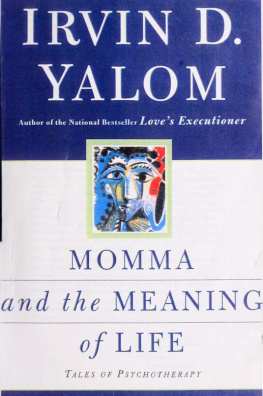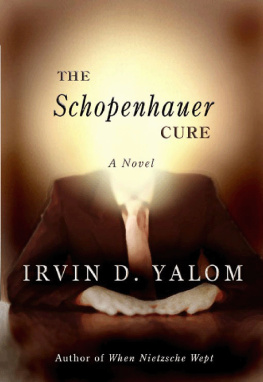Irvin D. Yalom - The Theory and Practice of Group Psychotherapy
Here you can read online Irvin D. Yalom - The Theory and Practice of Group Psychotherapy full text of the book (entire story) in english for free. Download pdf and epub, get meaning, cover and reviews about this ebook. year: 2020, genre: Politics. Description of the work, (preface) as well as reviews are available. Best literature library LitArk.com created for fans of good reading and offers a wide selection of genres:
Romance novel
Science fiction
Adventure
Detective
Science
History
Home and family
Prose
Art
Politics
Computer
Non-fiction
Religion
Business
Children
Humor
Choose a favorite category and find really read worthwhile books. Enjoy immersion in the world of imagination, feel the emotions of the characters or learn something new for yourself, make an fascinating discovery.

- Book:The Theory and Practice of Group Psychotherapy
- Author:
- Genre:
- Year:2020
- Rating:4 / 5
- Favourites:Add to favourites
- Your mark:
- 80
- 1
- 2
- 3
- 4
- 5
The Theory and Practice of Group Psychotherapy: summary, description and annotation
We offer to read an annotation, description, summary or preface (depends on what the author of the book "The Theory and Practice of Group Psychotherapy" wrote himself). If you haven't found the necessary information about the book — write in the comments, we will try to find it.
The Theory and Practice of Group Psychotherapy — read online for free the complete book (whole text) full work
Below is the text of the book, divided by pages. System saving the place of the last page read, allows you to conveniently read the book "The Theory and Practice of Group Psychotherapy" online for free, without having to search again every time where you left off. Put a bookmark, and you can go to the page where you finished reading at any time.
Font size:
Interval:
Bookmark:

Copyright 2020 by Irvin D. Yalom and Molyn Leszcz
Cover image naqiewei via Getty Images
Cover copyright 2020 Hachette Book Group, Inc.
Hachette Book Group supports the right to free expression and the value of copyright. The purpose of copyright is to encourage writers and artists to produce the creative works that enrich our culture.
The scanning, uploading, and distribution of this book without permission is a theft of the authors intellectual property. If you would like permission to use material from the book (other than for review purposes), please contact permissions@hbgusa.com. Thank you for your support of the authors rights.
Basic Books
Hachette Book Group
1290 Avenue of the Americas, New York, NY 10104
www.basicbooks.com
First published by Basic Books in 1970
Sixth Edition: December 2020
Published by Basic Books, an imprint of Perseus Books, LLC, a subsidiary of Hachette Book Group, Inc. The Basic Books name and logo is a trademark of the Hachette Book Group.
The Hachette Speakers Bureau provides a wide range of authors for speaking events. To find out more, go to www.hachettespeakersbureau.com or call (866) 376-6591.
The publisher is not responsible for websites (or their content) that are not owned by the publisher.
Library of Congress Cataloging-in-Publication Data
Names: Yalom, Irvin D., 1931- author. | Leszcz, Molyn, 1952- author.
Title: The theory and practice of group psychotherapy / Irvin D. Yalom and Molyn Leszcz.
Description: Sixth edition. | New York : Basic Books, [2020] | Includes bibliographical references and index.
Identifiers: LCCN 2020035476 | ISBN 9781541617575 (hardcover) | ISBN 9781541617568 (epub)
Subjects: LCSH: Group psychotherapy.
Classification: LCC RC488 .Y3 2020 | DDC 616.89/152dc23
LC record available at https://lccn.loc.gov/2020035476
ISBNs: 978-1-5416-1757-5 (hardcover), 978-1-5416-1756-8 (ebook)
E3-20201110-JV-NF-ORI
This new edition affords us the treasured opportunity to benefit from the wisdom and expertise of the phenomenal partnership of Irv Yalom and Molyn Leszcz. This work retains the strengths of past editions in terms of invaluable clinical insights and case examples, but introduces new material that enhances this edition. In response to the challenges posed by the COVID-19 pandemic, they have included a chapter on online groups. I look forward to sharing this updated edition and valued resource that is informed by recent research findings with my students and colleagues!
Alexis D. Abernethy, professor of psychology, Fuller Seminary
The partnership between Yalom and Leszcz brings new originality to a text thatlike no otherhas already shaped the field that it helped to spawn fifty years ago. Grounded in current scholarship, their further development of the interpersonal modelwide-ranging and comprehensivegives this book renewed standing for therapists of all orientationsa lasting treasure for practitioners and teachers alike.
John Schlapobersky, author of From the Couch to the Circle: Group-Analytic Psychotherapy in Practice
This book is a real classic. In view of an increasing acceptance of group psychotherapy within health systems of different countries, this recent edition is a truly essential help for clinicians and excellently bridges research results and clinical wisdom. It updates theory and practice issues of groups that meanwhile have supported generations of group psychotherapists.
Bernhard Strauss, University of Jena, Germany
Existential Psychotherapy
Every Day Gets a Little Closer: A Twice-Told Therapy (with Ginny Elkin)
Encounter Groups: First Facts (with Morton A. Lieberman and Matthew B. Miles)
Inpatient Group Psychotherapy
Concise Guide to Group Psychotherapy (with Sophia Vinogradov)
Loves Executioner
When Nietzsche Wept
Lying on the Couch
Momma and the Meaning of Life
The Gift of Therapy
The Schopenhauer Cure
Staring at the Sun: Overcoming the Terror of Death
Creatures of a Day
Becoming Myself
A Matter of Death and Life (with Marilyn Yalom)
Treating the Elderly with Psychotherapy: The Scope for Change in Later Life (with Joel Sadavoy)
Psychotherapy Essentials to Go: Achieving Psychotherapy Effectiveness (with Clare Pain, Jon Hunter, Robert Maunder, and Paula Ravitz)
I RV Y ALOM:
I would like to dedicate this book to Marilyn, my beloved wife of sixty-five years, who died in 2019
M OLYN L ESZCZ :
To the next generation: Sid, Pete, Lucy, and Margot
F IFTEEN YEARS HAVE PASSED SINCE THE FIFTH EDITION OF this textbook was published. Our task in this sixth edition is to describe the new and significant innovations in group therapy that have emerged during these years. We are pleased and grateful to continue our long collaboration, which began forty years ago at Stanford University. We have approached our work together as seasoned co-therapists and in writing this edition have sought to support and challenge one another. We write largely as we, with an interweaving of both voices. At certain points, to identify an experience personal to one of us, we switch to first person and include a parenthetical abbreviation to indicate which of us is taking over the narration (IY or ML).
Our aim is to provide our readers with a synthesis of new knowledge and accrued wisdom in the practice of group therapy. We make extensive use of clinical illustrations to bring these concepts and principles to life and make the book both practical and instructive. Like previous editions, this one is intended for students, trainees, and frontline practitioners as well as supervisors and teachers.
Since group therapy was first introduced in the 1940s, it has continued to adapt to reflect changes in clinical practice. As new clinical syndromes, settings, and theoretical approaches have emerged, so have corresponding variants of group therapy. The multiplicity of forms is so evident today that it makes more sense to speak of group therapies than of group therapy. The evidence is consistently strong, across all ages and clinical needs, that group therapy is effective, generally with outcomes equivalent to those of individual therapy, and far less costly. This is true both for mental health and for substance use disorder treatment as well as for the medically ill.
The Internet makes group therapy far more accessible today than it was in the predigital world. Geography is no longer the barrier to therapy that it once was. New technological platforms create new opportunities and challenges for group therapists: What is the same and what is different as group therapy moves from the group room to the group screen? These are questions we will address in this volume in a new chapter focused on online psychotherapy groups (see ).
Now, as clients from diverse ethnocultural backgrounds access group therapy, whether in North America or elsewhere, it is important for therapists to develop a multicultural orientation as well as sensitivity and expertise in cultural adaptation. Therapy groups have always been settings for difficult dialogues and discourse; race and gender identity issues can be effectively addressed in a responsive therapy group environment (see ). Group therapy is a powerful vehicle for working with traumatized and displaced individuals.
Font size:
Interval:
Bookmark:
Similar books «The Theory and Practice of Group Psychotherapy»
Look at similar books to The Theory and Practice of Group Psychotherapy. We have selected literature similar in name and meaning in the hope of providing readers with more options to find new, interesting, not yet read works.
Discussion, reviews of the book The Theory and Practice of Group Psychotherapy and just readers' own opinions. Leave your comments, write what you think about the work, its meaning or the main characters. Specify what exactly you liked and what you didn't like, and why you think so.





